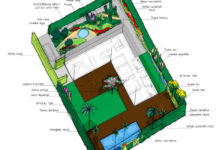Have you ever wanted to learn about Aquaponics, or how to start your own aquaponics system? I’m a huge enthusiast of this food growing method and would love to show you the basics!
Fish farming is an rising style in these types of components — one that is bringing hobbyists, investigators and food sellers equally. During the past decade, the sector has developed significantly, hammering a fresh and surprising path for sustainable agriculture. An increasing number of farmers are investigating what is identified as aquaponics (a combination between aquaculture and hyrdroponics). The effect is a hybrid program that breeds fish and crops in once.
It is well-known the Tampa Bay area is home to a few of the finest fishing on the planet. Spotted sea-trout, red drum, as well as the prized king mackerel are available off the sun’s rays State’s Gulf coastline. It is not surprising that about 90-percent of the tropical fish marketed in the US originate from this area.
“Folks are growing vegetables and herbs in their own back yards as well as growing it with meals fish or alternative forms of aquaculture products they could use up. Just how can it work? The set up looks more like a science project than the usual fish farm, but the outcomes are worth every penny. Generally, outside tanks function as the fish-raising space.
Nutritent Rich Water is the KEY to Aquaponics
Nutrient-rich water flows from the fish tanks and in to where the crops are expanding. Subsequently the water, which can be cleaned along the way, is returned straight back to the tanks. This re-circulation severely reduces water-use. The method also cuts back on fertilizer stimulation. Compared to aquaponics, raising fish the quaint manner is water intensive as well as calls for lots of fish waste that subsequently must be disposed.
The the academic system intends to take knowledge in the university and distribute it out in to Florida communities.
The thing is that since fish waste is included, it has been been hard to get a passing mark for aquaponic veggies from food-safety auditors.
Fish Stocking
However, before you scurry away in the idea of eating vegetables grown with the aid of fish waste, Tyson as well as other specialists assure that it is totally safe. (E. coli and other typical food pathogens aren’t part of fish waste.) The truth is, in the almost 15 years because Tyson continues to be working with aquaponics, he is never found an organization between this approach to fish farming and food-borne sickness.
Business specialists say that the USDA label is in the functions. Some expect it probably coming through within another year approximately. For the time being, it is improbable that Flo-Rida fish farmers will have the ability to sell to big supermarket chains without it. Instead, their homegrown fish and vegetables can be found at local eateries and farmer’s markets.
“Aquaponics is an excellent option as far as maybe not over-fishing our oceans,” states Gina Cavaliero, chief executive officer of Green Acre Aquaponics in Brooksville. “There is definitely ways we can do this and make food, rather than endanger our environment therefore much. In accordance with Cavaliero, farming fish aquaponically additionally eases worries about eating sea food in the petroleum-hit Gulf of Mexico. Green Acre Aquaponics now raises tilapia and koi fish utilizing an aquaponic system. They’ll shortly be adding mudcat for their operation, which will be an rising foods fish in the Tampa Bay area.
Understanding the Nitrogen Cycle
“The have a need for at least 80 to 100 lbs of catfish per week,” states Cavaliero. There is also a web-based marketplace. Like most Tampa place fish farmers, Green Acre does not use hormones in the creation procedure. If your fish becomes dis-eased and needs antibiotics, it’s quarantined in another tank till it is prepared to be re-introduced to the program.
Director Craig Watson claims his group supports farmers with disease diagnostics. “There is a a renewed level of fascination with food fish production in FL,” claims Watson, who operates mostly with decorative fish (believe tropical fish as well as other fish not employed for food or lure).
Ornamental fish and other marine-life characterize another enormous marketplace. From that point, they are offered nationwide to pet shops and hobbyists.
Published in Blog




![Conflict Wood [Video]](https://land8.com/wp-content/uploads/2021/07/land8-cover-ipe-land8x8-zac-tolbert-224x150.png)




